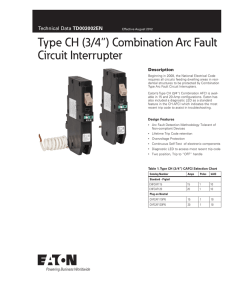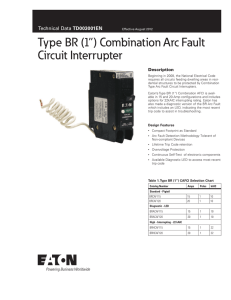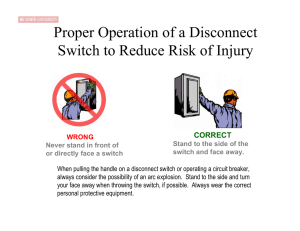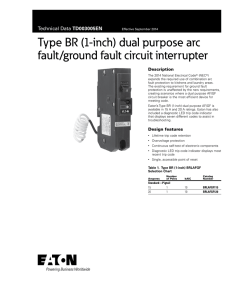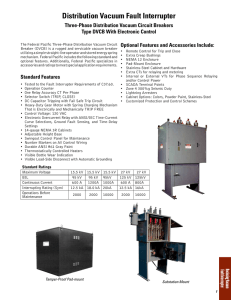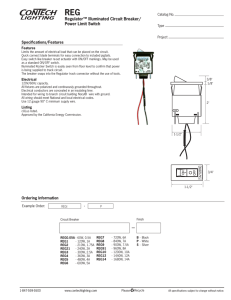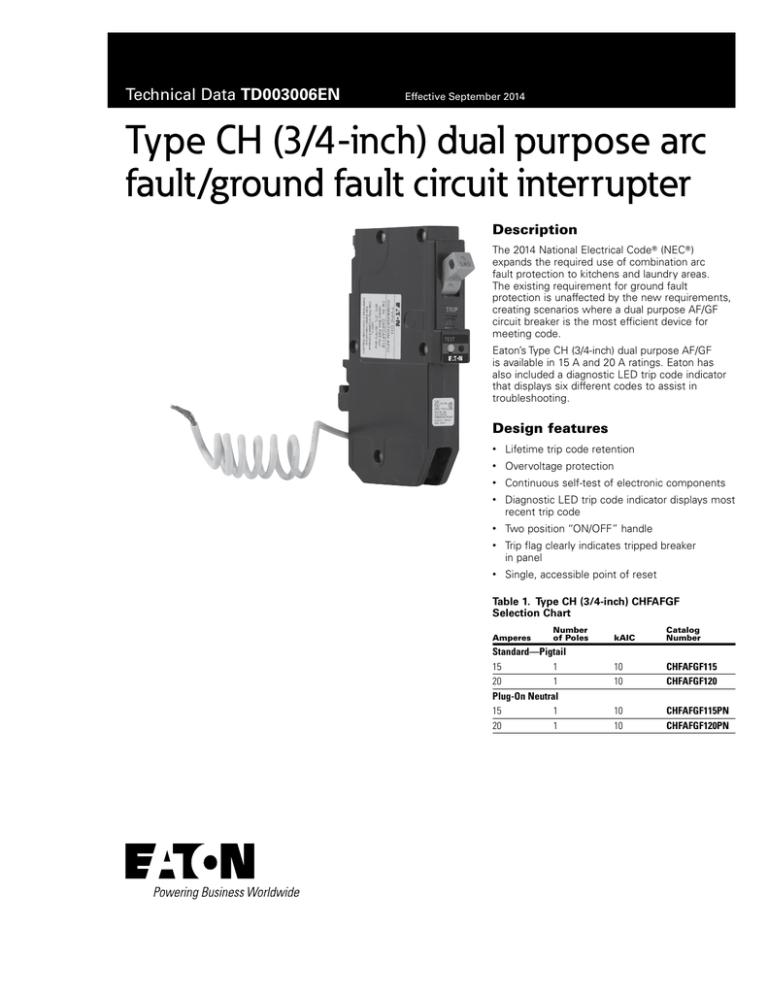
Technical Data TD003006EN
Effective September 2014
Type CH (3/4-inch) dual purpose arc
fault/ground fault circuit interrupter
Description
The 2014 National Electrical Code (NEC)
expands the required use of combination arc
fault protection to kitchens and laundry areas.
The existing requirement for ground fault
protection is unaffected by the new requirements,
creating scenarios where a dual purpose AF/GF
circuit breaker is the most efficient device for
meeting code.
Eaton’s Type CH (3/4-inch) dual purpose AF/GF
is available in 15 A and 20 A ratings. Eaton has
also included a diagnostic LED trip code indicator
that displays six different codes to assist in
troubleshooting.
Design features
•
Lifetime trip code retention
•
Overvoltage protection
•
Continuous self-test of electronic components
•
Diagnostic LED trip code indicator displays most
recent trip code
•
Two position “ON/OFF” handle
•
Trip flag clearly indicates tripped breaker
in panel
•
Single, accessible point of reset
Table 1. Type CH (3/4-inch) CHFAFGF
Selection Chart
Amperes
Number
of Poles
Standard—Pigtail
15
1
20
1
Plug-On Neutral
15
1
20
1
kAIC
Catalog
Number
10
10
CHFAFGF115
CHFAFGF120
10
10
CHFAFGF115PN
CHFAFGF120PN
Technical Data TD003006EN
Type CH (3/4-inch) dual purpose arc fault/
ground fault circuit interrupter
Effective September 2014
Table 2. Specifications
Description
Specification
Catalog number
Voltage requirement
Frequency requirement
Power consumption
Surge
Ambient operating
temperature
Humidity
Warranty
CHFAFGF115, CHFAFGF120, CHFAFGF115PN, CHFAFGF120PN
102 ≤ VRMS ≤ 132
60 Hz ± 2 Hz
1.3 W
In accordance with IEC 61000-4-5
–31 °F to +150 °F (–35 °C to +66 °C)
ULt standards
UL file number
0% to 95%, noncondensing
Limited lifetime
UL 489—molded-case circuit breakers, molded-case switches,
and circuit-breaker enclosures
UL 943—ground fault circuit interrupters
UL 1699—arc fault circuit interrupters
UL 1998—software in programmable components
E-45310
120 V~
Duplex Receptacle
Load
Power
Wire
(Black)
Neutral Clip Connects
onto the Neutral Bar
of the Panelboard to
Loadcenter Neutral
Load Neutral
Wire (White)
Figure 2. Type CHF Arc Fault Circuit Breaker Plug-On Neutral
Wiring diagram
120 V~
Duplex Receptacle
120/240 V~
Source
N A B
Load
Power
Wire
(Black)
Line B
Single-Pole
Neutral
Coiled White
Wire Connects to
Loadcenter Neutral
Figure 1. Type CHF Arc Fault Circuit Breaker
2
EATON www.eaton.com
Load Neutral
Wire (White)
Neutral
Equipment Ground
Figure 3. Single-Pole 120 V Load Application
Sourced by 120/240 Vac
120 V
Duplex
Receptacle
Technical Data TD003006EN
Type CH (3/4-inch) dual purpose arc fault/
ground fault circuit interrupter
Effective September 2014
Dimensions
Dimensions in inches (mm).
2.95
(74.9)
0.74
(18.8)
2.95
(74.9)
2.65
2.31 (67.3)
(58.7)
0.19 (4.8)
0.74
(18.8)
2.65
2.31 (67.3)
(58.7)
0.19 (4.8)
4.63
(117.6)
4.63
(117.6)
Figure 4. CHCAFPN
Figure 5. CHFCAF
EATON www.eaton.com
3
Technical Data TD003006EN
Effective September 2014
Table 3. Trip Codes
The following trip codes are displayed through the diagnostic LED
trip code indicator. The code will repeat 30 iterations. A “6” code
will appear as six short blinks of the LED followed by a pause.
A “1” code will appear as one blink followed by a pause.
Trip
Code
No code
recorded
1
2
3
4
5
6
Description
Thermal/short-circuit/TEST/manual disconnect
Note: The breaker does not record trip codes for the conditions listed
below. If the breaker is tripped by one of these conditions, the LED will
display the most recent recorded trip code.
• Thermal overload detected by the mechanical portion of the breaker
• Short-circuit detection by the mechanical portion of the breaker
• Pressing the TEST button
• Manually switching the breaker off
Upon installation, if the breaker has not experienced a trip that records
a code, it will display the last trip code recorded from tests performed at
the factory.
Series arc
Description: A low current arc has been detected within one of the
current pathways. Low current arcs are typically series arcs, and are
typically found in worn or degraded appliances and extension cords, poor
connections in appliances or fixtures, or in contacts within equipment.
Resolution: Identify the equipment causing the tripping, and repair
or replace.
Parallel arc
Description: A high current arc has been detected between two
conductors. High current arcs are typically parallel arcs, and are usually
found in installed wiring where the wire has been compromised by a nail
or screw, tight staple, and damaged insulation.
Resolution: Locate fault location and replace wire.
Short delay
Description: Short delay is an electronic backup to the short-circuit
mechanism.
Resolution: Identify the location of the short-circuit and repair.
Overvoltage
Description: The breaker will trip if it experiences voltage of 160 V rms
or greater. The breaker can be reset and the TEST button can be pushed to
verify that the breaker is working properly.
Resolution: Investigate utility power for imbalance in the phases or loss
of neutral.
Ground fault
Description: Current has found an alternate path to ground, which could
cause harm to people or property.
Resolution: Determine the location of leakage current and repair.
Self test failure
Description: The breaker continually tests the internal electronics and
software to ensure that the arc fault detection technology is working
properly. If the self-diagnostics fail, the breaker will trip. The built-in selftest features will not allow the AG/GF breaker to re-latch if it detects a
malfunction in the AG/GF detection circuit.
Resolution: Replace the breaker.
Type CH (3/4-inch) dual purpose arc fault/
ground fault circuit interrupter
Troubleshooting
See www.eaton.com/troubleshooting for more information.
Contact the Eaton Technical Resource Center at
1-800-326-9513 for further assistance.
Eaton
1000 Eaton Boulevard
Cleveland, OH 44122
United States
Eaton.com
© 2014 Eaton
All Rights Reserved
Printed in USA
Publication No. TD003006EN / Z15712
September 2014
Eaton is a registered trademark.
All other trademarks are property
of their respective owners.

